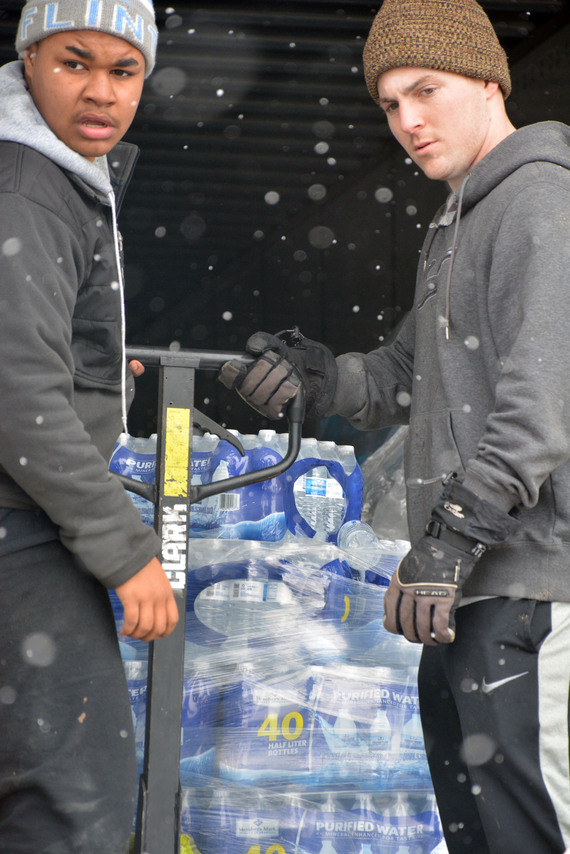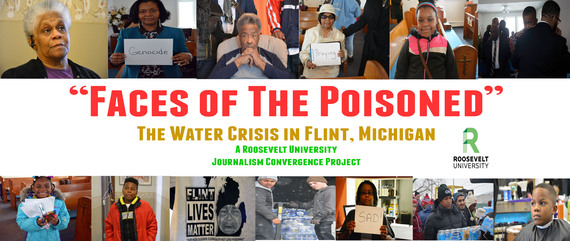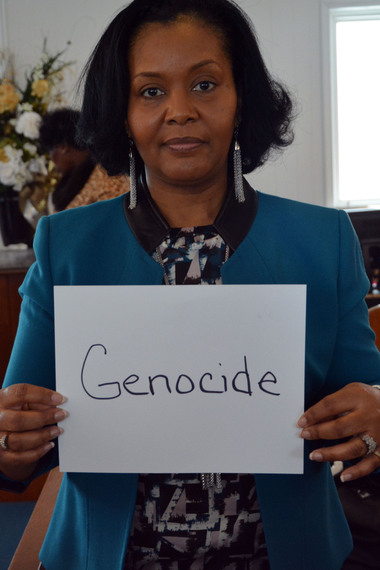
Photo: Pamela Powell, a native daughter of Flint whose parents still live there said she feels betrayed by the government, which switched the city's water source that resulted in poisoned, lead-laden water that residents, including her parents, consumed. Powell, who lives in Illinois, calls it "genocide."
Through the predawn darkness, the coach bus carrying a reporting team of Roosevelt University journalism students and me, their professor, rolled across Interstate 94 through a wintry mix, from Chicago to this former Midwest automotive giant.
Our mission--at least for the first leg of our journey--was twofold: To report as part of a convergence project in the capstone undergraduate course but also to volunteer, helping to pass out supplies to the people of Flint.
We arrived to find the relief operation bustling. No identification needed. No hassle. Only human kindness.
No probing questions. Only: "How many families?" "Do you have babies?"
The "purified water" was for families with babies.
Once loaded with water, weary residents--whose municipal water system in Flint has pumped a toxic soup of lead-laden water into thousands of homes remains unfixed--pulled away onto Dort Highway. The line slowly inched forward as more residents seeking water caused the stacks to slowly dwindle.
A still proud "Vehicle City," even if mortally wounded by the water crisis that has impacted tens of thousands here, it breathed and pulsed with the sights and sounds of life on a snowy weekend. And yet, even beneath the veneer of even the most brave and hopeful of souls, lie an ugly truth as clear as spring water:
That an almost unthinkable injustice has been done here and that, to date, we have likely only witnessed the tip of human suffering that will impact this city and its residents for many years to come.
Among the faces of the poisoned are infants, born with medical complications caused by ingesting lead in utero; small children who bear rashes and developmental disabilities; and also the elderly who, now in their golden years, bear maladies like kidney cancer and Legionnaire's disease. All of these have been attributed to the toxic water--a reportedly lead-laden, toxic soup--which the people here drank, bathed in, or consumed in myriad ways since the city's water source was switched in April 2014 from Lake Huron to the polluted Flint River apparently all in the name of saving money.
"It has changed the way we live," Michigan State Representative Sheldon Neeley (D-Flint), old us during our recent visit. "It has affected the quality of life for every resident inside the city of Flint."
"It definitely has affected me personally," Neeley said. "Every time I think about my mother having to lug a 20-pound pack of water from the front door--that's being delivered--to the back kitchen, I'm upset about it," he said, adding that his mother is a stroke survivor.
"When I think about my wife is afraid to soak in the bathtub because she doesn't want to soak in the water, it affects me. Every time I'm looking at dinner being prepared and I'm wondering, watching my wife try to wash collard greens with bottled water is a challenge unto itself."
Signs of Hope
Across Flint are signs of resilience, signs of hope, rising above simmering anger and fears over the ultimate toll this crisis will exact on a city of 100,000, where nearly half of its population lives in poverty and 60 percent is African American.
Most apparent is that the human need for clean water--not in a Third World country but in the heartland of America--has mobilized volunteers from across the nation and local churches to help others. Clear that the public trust has been shattered like glass and that repairing it will take far more than a visit by President Barack Obama and a single sip from a glass of Flint water with verbal reassurances that all is well now.
Outside Greater Holy Temple Ministries Church of God In Christ in North Flint, my students and I were among throngs of volunteers working in the Saturday cold, unloading two semitrailers of bottled water, food and snacks. Through the cold and snow, well into the afternoon, they came.
Seeking bottled water, they streamed into the church's parking lot, pausing long enough for volunteers--most of us from out of town--to fling open and fill their trunks and sometimes their doors, then fill them with cases or bags of bottled water. We bore witness to their heartfelt thanks. To their scars and tears. To the unquenchable need for water.
Water. H2O--two hydrogen atoms bonded to a single oxygen atom. It is the chemical compound that comprises 70 percent of the earth. Anywhere there is water, scientists reason, there just might be life. Water makes up nearly 60 percent of the human body. Without it, humans can survive only a few days. Water flushes toxins from the human body, dissolves and delivers essential nutrients. Water itself is a nutrient.
Water is more than a convenience. It is essential.
No Baths; No Showers
For Bishop Roger L. Jones, pastor of Greater Holy Temple, it's simple to sum up the crisis in Flint.
"If you get to the Michigan line it says Welcome to Michigan, Pure Michigan... What happened in Flint?" Jones said, standing in the church's parking lot that for months of weekends now has been transformed into a makeshift water distribution center.
"Welcome to Flint, poisoned water, corroded pipes and people are being victimized and some have died," Jones said. "The babies are in jeopardy. People bath in this water. People cook in this water. And the water has to be boiled. This is devastation.
"What does it mean for a family to have to bathe in bottled water?"
Based on our two-day reporting immersion in Flint, it means different things for different people. After interview after interview--with children and adults, with public officials and pastors and volunteers on the front lines, with business owners and others over a two-day immersion project--this much was clear:
The crisis is worse than we gleaned from all the stories we read or all the research we did before we arrived. Indeed we discovered other layers to this crisis--the hidden horrors and the realities of day-to-day life without clean tap water.
The picture that emerged is one in which a mother bathes her infant in bottled water. That for one single mother of three, Sunday is the most taxing day of the week as she and her children all have to heat water for wash-ups in the morning before church. That life without clean water ain't been no crystal staircase.
You can't take baths or showers. You need bottled water to cook, wash meat or fruits and vegetables, dishes. You can't afford to forget that the water in the sink is potentially hazardous. Remember to deny the natural reflex after using the bathroom to turn on water to wash your hands and go for the hand sanitizer instead.
We discovered that some women's hair is falling out, they suspect, for washing in toxic water, of from not being able to wash the hair; that the residents are still having to pay water bills for water they can't use; and that the water needs to be fixed now.
We also discovered that here lives a resilient people. A people of faith. A people of hope.
That much is clear, especially to Rev. Daniel Moore, pastor of Shiloh Missionary Baptist Church of Flint, founded 97 years ago and the city's second oldest black church. For Moore, like so many in the faith community in Flint and beyond, the crisis has meant an opportunity to serve.
And yet, inside Shiloh, a basement water cooler and the sight of bottled water serve as signs of the times. Reminders that the crisis lingers, like the pastor's moratorium even on one of the church's chief ordinances: baptisms.
"I have people to baptize, but I will not baptize in that water," Moore said.
To read and experience the convergence reporting project, "Faces of The Poisoned," on the water crisis in Flint by John W. Fountain's class of journalism students at Roosevelt University, visit our website: www.facesofthepoisoned.rujcp.com
Email: author@johnwfountain.com
Website: www.johnwfountain.com
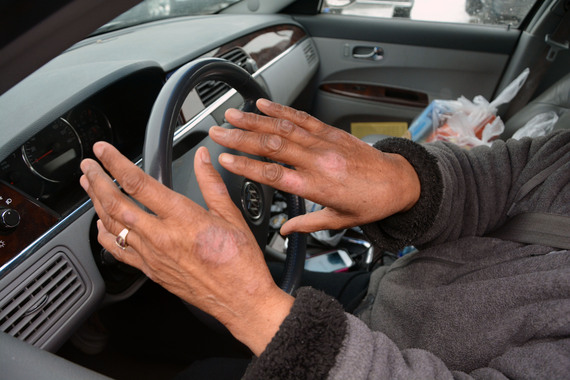
The hands of a Flint woman bear a rash that she believes was caused by the poisoned drinking water in which local residents also bathed after the city switched its water source in April 2014.
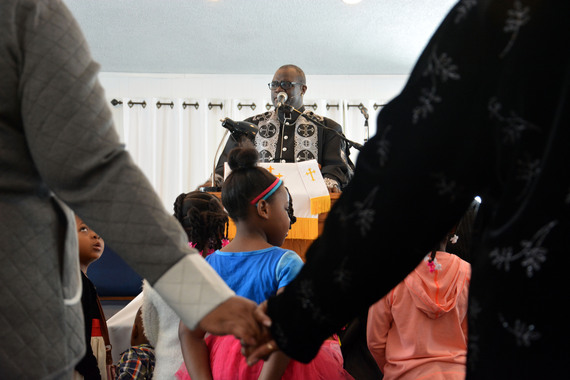
The Rev. Daniel Moore, pastor of Shiloh Missionary Baptist Church of Flint, says, "I have people to baptize, but I will not baptize in that water."

